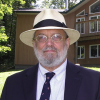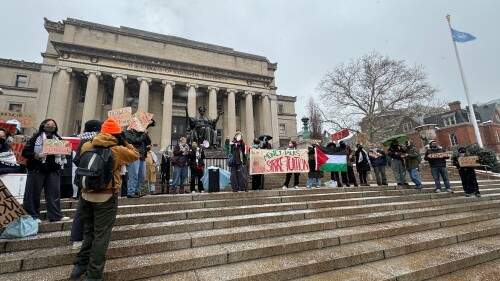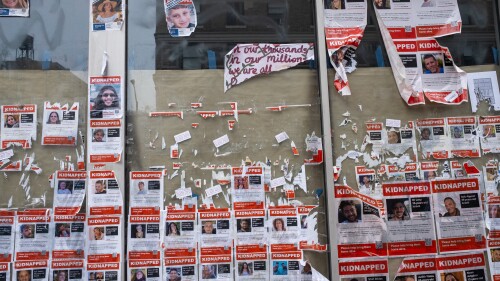American and Canadian university campuses rang for weeks on end with celebrations of Hamas’s “great victory” of Oct. 7. The murder of civilians, the burning alive of families, the gang rape of women to death, the roasting of children in ovens, and the beheading of babies all are touted as legitimate steps toward Palestinian liberation from “occupation, apartheid, and genocide.”
Students, professors, administrators, especially “diversity, equity, and inclusion” DEI officers, chant “from the river to the sea, Palestine will be free [of Jews]” to recommend the destruction of the state of Israel and the annihilation of the Jewish people.
Just in case the message is too subtle, it is clarified in standard comments, such as “gas the Jews” and “Hitler was right.” “Globalize the intifada"—an uprising that includes assassination and the bombing of buses, restaurants, and other soft civilian targets—hints that the 21st-century Holocaust will not stop with the extermination of Jews but will go on to consume Christians, Hindus, and others who stand in the way of Islamic supremacism.
The murder of civilians, the burning alive of families, the gang rape of women to death, the roasting of children in ovens, and the beheading of babies all are touted as legitimate steps toward Palestinian liberation from “occupation, apartheid, and genocide.”
University officials have been loath to discourage such exhibitions, even less to punish violation of campus rules and negation of the spirit of DEI. The presidents of Harvard University, Massachusetts Institute of Technology, and the University of Pennsylvania pleaded, in their congressional hearings, that it is their responsibility to protect academic freedom and that they must not discourage speech and other forms of expression, such as vandalism, trespass, and intimidation, even when regarded as abhorrent by some.
But are these displays of genocidal anti-Semitism protected by academic freedom?
These university presidents claimed that calling for the genocide of Jews was protected constitutional speech under the First Amendment. That is true. But private universities are not obliged to respect the First Amendment, which defines restrictions to government action, not to private organizations, which are free to establish their own rules.
Furthermore, these university presidents were being disingenuous, given that their records of upholding free speech have been the worst in the United States, according to the Foundation for Individual Rights and Expression (FIRE). Harvard ranked at the absolute bottom of the list of universities upholding free speech, number 248 out of 248, judged to be “abysmal.” The University of Pennsylvania ranked next worst, number 247, and MIT listed at a mediocre number 136.
The question that was dodged by the university presidents was whether their university codes of conduct allowed calls for genocide. They refused to answer. But let us consider another possibility. What about academic freedom? Does it permit calls for the genocide of Jews?
Academic freedom is a principle invented to support the Enlightenment university’s search for academic truth. The understanding is that free debate of a variety of points of view and the ideas that flow from them is the best guarantee of a successful approach to discovering truth.
Academic freedom is the freedom to pursue academic inquiry. It is not the freedom to pursue spiritual enlightenment, sexual freedom, or political revolution. Academic freedom is restricted to the pursuit of academic goals. Other goals may be pursued under the aegis of free speech, a much more commodious category of allowable discourse.
Academic freedom is understood to exist in the context of exploring theories of existence, of formulating hypotheses about the world, of developing predictions about the way things work, and, critically, of bringing evidence to bear to test these ideas and drawing conclusions based on the evidence. The dialectic between the imaginative formulation of theories and the down-to-earth collection of relevant evidence is seen, in the Enlightenment academic world, the path to sound knowledge and, ultimately, to truth.
Harvard ranked at the absolute bottom of the list of universities upholding free speech, number 248 out of 248, judged to be “abysmal.”
Political advocacy, accusations of bad behaviour, and personal and political disparagements, as non-academic discourse, do not fall under the protection of academic freedom. Calls to revolution or genocide, and claims and accusations of sexism, racism, Islamophobia, transphobia, etc., are not academic and are not protected under any academic understanding of academic freedom.
However, as anyone with at least a passing familiarity with contemporary universities knows, these institutions have entirely abandoned Enlightenment ideals, such as the search for truth. Almost every North American university has adopted a post-Enlightenment vision that replaces the search for truth with the advancement of “social justice,” defined as the implementation of “diversity, equity, and inclusion.” There is no inquiry into or study of social justice; rather, social justice, and its DEI policies, is taken as the established answer to all questions of importance about social life and the purpose of the university.
In the new social justice university, “academic freedom” is limited to the freedom to repeat the established DEI slogans. No criticism of the social justice mantras is allowed, no matter how factually based. Studies that refute the claims of DEI rationales are forbidden, and in fact are punished particularly severely. Any deviation from asserting social justice truths leads to mandatory “re-education,” punishments such as being banned from teaching, or complete cancellation through excommunication, i.e. being fired.
Some staff cancellations are due to disputes about administrative mandates. For example, critiques of the fanatical DEI impositions, which implement favouritism based on race, sex, sexuality, ethnicity, and disability, have led to punishment, obligatory re-education, reduction in status, and/or termination. Student complaints about professors whose grades are believed to be too harsh, or professors who refuse to give special benefits to certain categories of students, have led to termination. These disputes about administrative procedures are at the margins of the area of academic freedom.
Dead centre of academic freedom are disputes that arise from academic theories, studies, and conclusions. Social justice universities rest on an official narrative, any contradiction of which puts the academic advancers of such heresies at risk.
For example, a sacred belief of the social justice university and its DEI commissar enforcers is that any statistical disparity between census categories must have arisen from racist, sexist, homophobist, Islamophobist, and ableist discrimination. Theories, studies, and conclusions that statistical disparities result from other causes are rejected and suppressed.
In the new social justice university, “academic freedom” is limited to the freedom to repeat the established DEI slogans.
Other sacred social justice beliefs are that police and whites murder innocent blacks as part of the “systemic racism” that is a foundational social justice axiom. Statistical analyses showing that blacks are murdered almost exclusively by other blacks, that deaths at the hands of police are mainly the result of violent resistance, and that more blacks murder whites than the reverse are heatedly rejected, and the advocates of evidence are cancelled.
Rather, the social justice university has adopted the neo-Marxist division of society into census category oppressors and oppressed. It has made its priority the advocacy and benefitting of the alleged oppressed, the blocking and demeaning of the oppressors. And it is advancing its narrative by blocking any academic work that is a threat to its simplistic and racist dyadic conception of good and evil. Academic freedom must be suppressed to advance the higher goals of social justice.
The anti-Semitism so dramatically demonstrated at universities around North America is not justified by academic freedom, because it is purely political and not at all academic, just as are the universities themselves.








